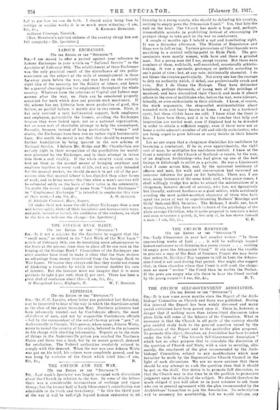LABOUR EXCHANGES.
[To THE EDITOR Or THE " SPECTATOR.")
am moved to offer a protest against your reference to Labour Exchanges in your article on "National Service" in the Spectator of February 10th. The establishment of these Exchanges was the only practical result of the disturbance of the public conscience on the subject of the evils of unemployment in those tar-away years before the war, and was based on the entirely right idea of the necessity for the fluidity of labour, and hence for a general clearing-house for employment throughout the whole country. Whatever form the relations of Capital and Labour may assume after the war, no State can be considered properly organized for work which does not provide such machinery. If the scheme has not hitherto been more productive of good, this failure, or partial failure, is mainly due to two causes. First, it has only received a very half-hearted support, both employers and employees, particularly the former, avoiding the Exchanges because they were looked upon, not as is national organization, but as some sort of charitable attempt to help the unemployed. Secondly, because, instead of being particularly " human " and elastic, the Exchanges have been run on rather rigid bureaucratic lines. But surely the moral is not that they should be exposed to further humiliation by being ignored in the new scheme of National Service. I believe Mr. Hodge and Mr. Chamberlain are entirely right in their recognition of the possibilities for useful- ness possessed by the Exchanges, and in their attempt to infuse into them a real vitality. If the whole country could come to look on them as the normal means of bringing employer and employee together in every rank of life, and not as only intended for the manual worker, we should do much to get rid of the per- nicious idea that manual labour is less dignified than other forms of work, and to bring nearer the time when a man's services will be-estimated solely on the basis of their value to the community. No doubt the recent change of name from " Labour Exchanges " to " Employment Exchanges" is intended to emphasize this view of their work.—I am, Sir, Ae., A. 0. JENS INGS. II Adelaide Crescent, Mote, Sussex.
l It under (heir new name the old Labmir Exchanges show a new and better spirit, shako off their Socialistic and bureaucratic ways, and gain, instead of forfeit, the confidence of the workers, we shall be the first to welcome the change.—Ere Spectator.]






































 Previous page
Previous page